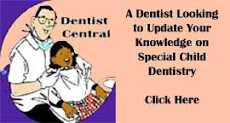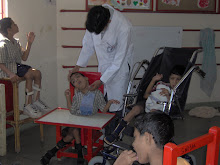 Dr.Sharat Chandra Pani
Dr.Sharat Chandra PaniIn the last post in this series we spoke about the small things you can do for your child that will go a long way in preventing dental disease. We also spoke about the possible use of specific mouthrinses which have the potential to prevent dental disease in your child. Today we look at the evolution of these mouth rinses and also at the rinse that suits your child the best.
What are Mouthwashes?
Mouthwashes serve as an adjunct to toothbrushes and floss in maintaining oral hygiene. The mouthwash has come a long way since the days of the ancient Greeks - who used Donkey's milk, and the Portuguese - who preferred human urine. A mouthwash is a liquid medicament, with an active chemical ingredient that reduces the levels of harmful bacteria in your child's mouth. They assume a great significance in the oral health of children who cannot; or will not; brush.
The first modern mouthwashes, such as the popular 'Listerine' marketed as "anti-halitosis" rinses were high in their alcohol content. While they do reduce the number of harmful bacteria, they have an efficacy of only around 20% and, because of their alcohol content are not suitable for children. Indeed for the greater part of the 20th century, mouthwashes were viewed as cosmetic rather than therapeutic agents,
What is a therapeutic mouthwash and how does it help my child?
A therapeutic mouthwash is a mouthwash that has a stronger action than a cosmetic mouthwash and contains certain chemicals that are selective for specific groups of harmful bacteria. Broadly they may be divided into
- Antiplaque/antigingivitis rinses - that fight gum disease
- Anticariogenic rinses - that prevent tooth decay
Chlorhexidine
Chlorhexidine Gluconate is a chemical that destroys harmful oral microorganisms and is a constituent of several therapeutic mouthwashes. Used in concentrations ranging from 0.12% to 0.2% it is highly effective in controlling gum disease. Studies have shown that the rinse is also effective against the bacteria Streptococcus mutans, which is one of the main causative agents of dental caries. Chlorhexidine is also safe if accidentally ingested. The only drawback of chlorhexidine is that if it is used for over 2 weeks it causes a staining of the teeth and also increases the chances of causing deposits on the teeth. Chlorhexidine, while effective in maintaining the oral health of children who are unable to brush has definite side effects and must be used only under the supervision of a preventive dentist who is well versed with protocols for long term chlorhexidine use.
For a complete list of Chlorhexidine rinses avaiable in India click on the link below http://www.cimsasia.com/Page.aspx?menuid=mimssearch&searchcategory=DRUGNAME&searchstring=chlorhexidine+mouthwash
Fluorides
If you were to look up fluorides on the Internet, you would find yourself in the middle of a heated debate, with one group trying to convince you that there is no greater wonder drug for your child's teeth while another tells you how it will destroy everything; from your child's bones to his heart and kidneys. I will take neither side.
Fluoride is an element that is found in the earth's crust and eventually finds it's way into our water. In concentrations of 0.7 to 1.2 parts per million, it strengthens the teeth, stops the growth of bacteria and therefore prevents tooth decay. But if one were to consume an excess of the element, it would result in a discoloration of the teeth, and as the concentration increases it can cause effects on bone, heart and kidney.
The safest way to harness the beneficial properties of fluoride would therefore lie in not ingesting the fluoride but in using topical applications of fluoride. One of these topical applications is the use of fluoride mouthrinses. While fluoride mouthrinses have been shown to greatly reduce tooth decay, and are certainly useful in children with medical conditions such as congenital heart disease or renal failure, I would not recommend their use in children with severe neuromuscular disorders such as some cases of cerebral palsy, as they may end up ingesting far more mouthwash than is acceptable. Although the one-time ingestion a cap full of fluoride mouthrinse is not fatal or even dangerous, a prolonged daily ingestion can be dangerous. A safer delivery system of fluoride in such children would be the use of a professionally applied fluoride varnish.
To view the different fluoridated mouthwashes available in India, click on the link below http://www.cimsasia.com/Page.aspx?menuid=mimssearch&searchcategory=DRUGNAME&searchstring=fluoride+mouthwash
To summarize, medicated mouthwashes can greatly improve the oral hygiene of a child with special health care needs. However the parents must be aware of the simple fact; A mouthrinse is no good if your child can't rinse! In the next post of this series we will look at the role of fluoride in preventing dental disease in your child.
For Further Queries you can contact me;
Dr Sharat Chandra Pani
Consultant Pediatric and Preventive Dentist
Senior Lecturer
KVG Dental College
Sullia India
+919886374024
sharatpani@hotmail.com
Dr Sharat Chandra Pani
Consultant Pediatric and Preventive Dentist
Senior Lecturer
KVG Dental College
Sullia India
+919886374024
sharatpani@hotmail.com








2 comments:
Are you with or against mouth washes containing alcohol (for adults)?
Do you believe (or from your experience) they increase the risk of oral cancer?
I do not believe alcohol containing mouthwashes are effective as an antimicrobial mouthwash. The whole purpose of alcohol in mouthwashes is to produce a sense of "freshness", i sincerely doubt any claims these mouthwashes make of being anti-microbial. I however believe that there is insufficient evidence to link link them to cancer
Post a Comment